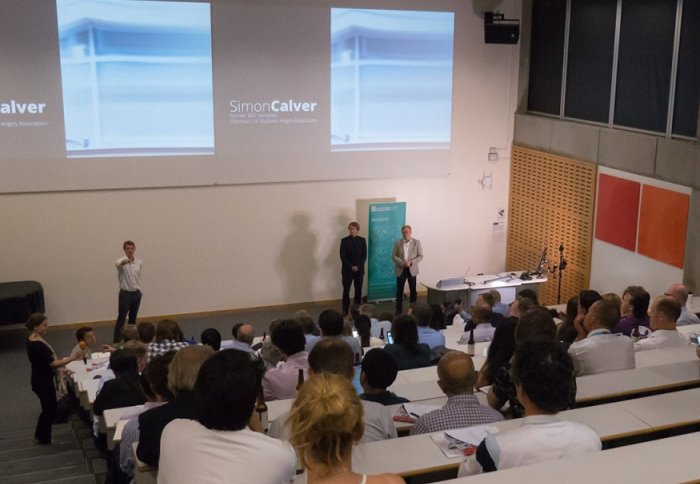Online education needs serious investment agree experts at Imperial talk

The digital learning market will give businesses an opportunity to invest in technology that could transform the way people learn in future.
This was the consensus of experts at a talk co-hosted by the Edtech Lab at Imperial College London and online investment platform SyndicateRoom this week: An evening with Simon Calver: The Future of Learning. The talk was part of London EdTech Week – a week-long event that aims to showcase the latest trends in educational technology, bringing together tech companies with businesses, universities and schools.
Imperial alumnus Arjun Hassard, Head of Product at SyndicateRoom told guests: “What the early-stage investing and education worlds have in common is that you're unlikely to be successful if you take a short-term view of your customers. You need to maximise their potential for success over a 5-10 year period through continued support and products that have long-term utility at their core. That's why you see Udacity getting involved in talent acquisition, and SyndicateRoom working on tech that enables investors to help their portfolio companies scale post-investment."
He highlighted how although technology is rapidly transforming the way people learn, the global education sector is far from saturated by technology: “The $6trillion education market has only experienced a penetration by apps, platforms and digital services of about three percent, compared to 35 percent in the 'content' industry. This means there’s a vast expanse to grow into for entrepreneurs, investors, and some established tech firms who will no doubt tack towards this enticing opportunity"
“Machine learning is set to make online learning even easier and the use of big data in creating new education products is set to double in the next 18 months."
– Simon Calver
Partner, BGV Ventures
Simon Calver, Partner at BGF Ventures, a company that looks to invest in upcoming UK entrepreneurs, set out the challenges facing companies who are looking to invest in edtech.
He warned that as many as 50 per cent of technology companies won’t succeed, and urged investors to take a calculated risk by keeping their eye on emerging areas that provide the strongest growth potential.
“Technology is rapidly changing before our eyes, which smaller companies are taking advantage of by innovating more quickly than larger firms,” he said. “However, the edtech sector is still dominated by larger companies which may prevent smaller firms from succeeding - unless investors recognise their potential.”
Mr Calver said big data and artificial intelligence were among the emerging trends that had the greatest potential to transform the global education market.
“Machine learning is set to make online learning even easier and the use of big data in creating new education products is set to double in the next 18 months. These trends will help technologists expand their services to new users all around the world and improve the online learning experience,” he said.
He advised education technologists that learning platforms used by universities must form part of the business plan.
He said: “You need to have a critical mass of content to have a strong product that people will use over the long-term. The product must have a global focus and address a real gap in the market.”
He said that ultimately, firms must think about what makes their company and products unique. “What is the real point of difference that will make your company stand out and what makes you attractive to potential investors?”
He added that to succeed in a fiercely competitive marketplace, companies needed to know how to bounce back from setbacks if a new product didn’t succeed.
Dr David Lefevre, Director of the Edtech Lab at Imperial College Business School, said: “As one of the leading universities in the area of edtech and online learning, we recognise the crucial role that technology plays in opening up access for more people to study for a degree online.
“But investing in new technology is crucial, which is why London Edtech Week is a great opportunity to bring together experts in the field with businesses to address this challenge.”
Article text (excluding photos or graphics) © Imperial College London.
Photos and graphics subject to third party copyright used with permission or © Imperial College London.
Reporter
Laura Singleton
Communications Division